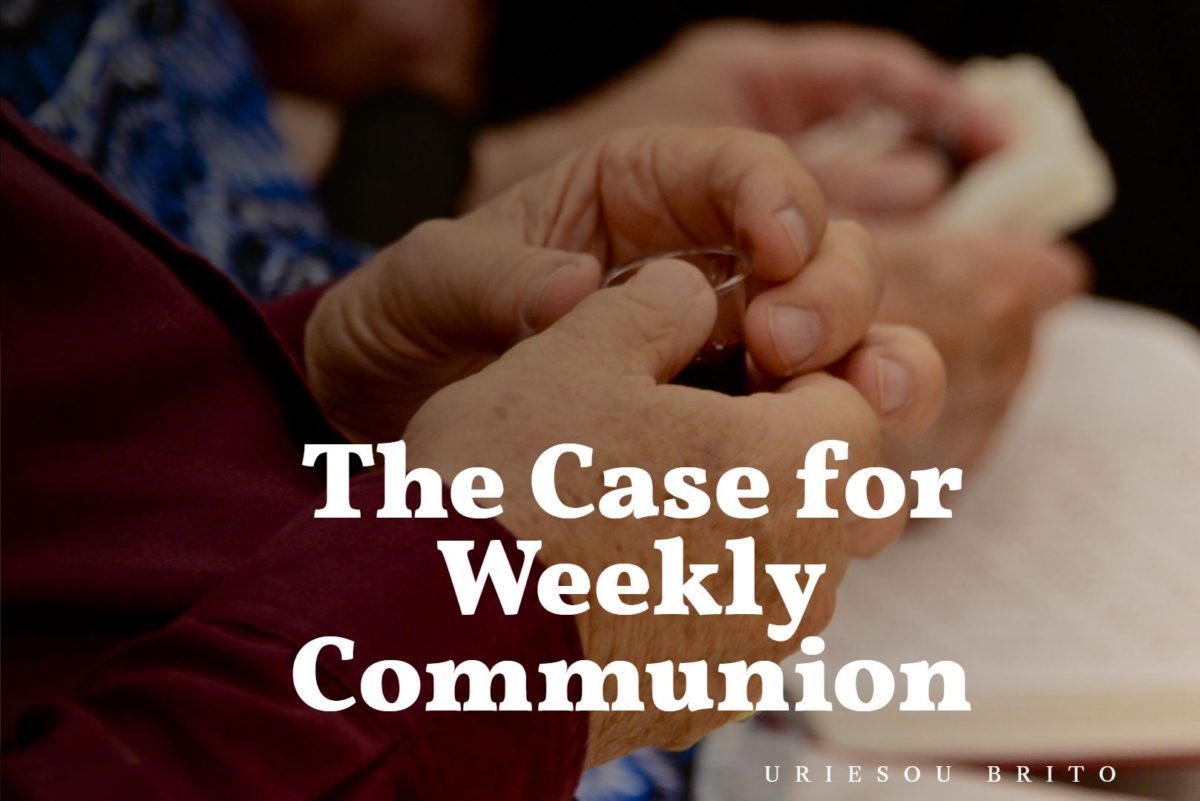Evangelicals like myself rooted in the Reformation came very late to the beauty of weekly communion. I was a sophomore in college before I realized that the vast stream of the Protestant tradition celebrated communion weekly. For most of my life, I assumed the table was reserved for special occasions like Easter or Christmas. In fact, I attended a Brethren congregation that did communion once a year. But as I broadened my theological interests, I understood the Supper’s function in the liturgy and in the theology of the church and it became unbearable to contemplate the absence of it during a worship service.
Historically, our Reformed forefathers—including Luther and Calvin—desired communion to be weekly. In fact, the early centuries of the Church and the majority of Protestant Churches in the 16th century practiced weekly communion. It was only in the 19th century, and in particular, during the Prohibitionist movement, that weekly communion became mostly obsolete. Therefore, the infrequent practice of communion is rather new in the church. Now, this does not mean it’s wrong, but it should raise questions. The Didache, one of the earliest records of the church after the Bible says the following:
“On the Lord’s own day gather together and break bread and give thanks, having first confessed your sins so that your sacrifice may be pure.”
The Church believed that in celebrating the sacraments weekly we become a purer people. This is not because there is something magical in the bread and wine, but because God uses these means to communicate his presence and strength to us. Additionally, the Early Church believed that the Lord’s Supper made us a more thankful people. We don’t often associate communion with thankfulness, but the very term “Eucharist” is not some invention of men. It is the word Paul uses to refer to the Lord’s Supper. The word means “thanksgiving.” The Lord’s Supper is a Thanksgiving meal; a Eucharistic meal.
The Bible makes a clear case that every time the people of God gathered for worship, the Lord’s Supper was a regular part of that gathering. Acts 2:42 says:
“And they devoted themselves to the apostles’ teaching and the fellowship, to the breaking of bread and the prayers.”
There is a definite article before bread, making the text read “the breaking of the bread (τοῦ ἄρτου). This is not a generic reference to a household meal, but it is in reference to a particular kind of bread, the eucharistic bread used at the Lord’s Table.
Acts 20:7 says:
“And they devoted themselves to the apostles’ teaching and the fellowship, to the breaking of the bread and the prayers.”
Again, when the Early Church met, they always had the Lord’s Supper. In a time when persecution was rampant, the people needed to be comforted by and give thanks to God as they ate together with God’s people in worship. I had mentioned earlier that the Early Church up to the first thousand years and later the Reformation, firmly believed in weekly communion. But there came a time when the Church abandoned this practice. In fact, as Keith Mathison observes in his book “Given For You,” the infrequent communion practice became the practice of the Roman Catholic Church in the 13th century and continued until the Reformation period. In those days, members could only partake of the sacraments once a year. It was against this background that “such men as John Calvin and Martin Bucer called for a return to the Apostolic Christian practice of weekly communion.” We might say that part of the motive of the Reformation was to undo the Church’s practice of infrequent communion and return to the Early Church practice of weekly communion.
Calvin writes in response to the common practices of the day:
“The Lord’s Table should have been spread at least once a week for the assembly of Christians, and the promises declared in it should feed us spiritually.”
Note Calvin’s use of the phrase “at least,” implying that there were other special occasions when the Supper was crucial in the formation of Church life besides the ordinariness of its practice on Sundays.
As Professor Michael Horton once observed, “Your view of the nature of the Lord’s Supper will determine the importance of it in the worship service.” It should come as no surprise then, that those who view the Lord’s Supper primarily as a matter of subjective mental recollection would see no need to celebrate it frequently. But when we begin to view the Lord’s Supper as a meal of joy and a means of grace to sustain and nourish us, then we quickly begin to expect each Lord’s Day to conclude with a meal just as our day ends with Supper. The Lord’s Supper is not a religious add-on to the regular worship service, it is an integral meal prepared for those who are called to minister to the world. The meal is a preparation for our tasks during the week.
















The Fellowship exhibited by your congregation attests to the significance of the spiritual meal that you partake together. It is the visible bond that can be seen by others, outside of your knitted together group. I can imagine the Lord knocking at your door, and each and all of you inviting Him to Sup with you. Well done Pastor Uriesou Brito.